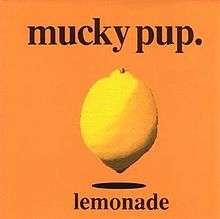Lemonade (Mucky Pup album)
Lemonade is the fifth studio album by Mucky Pup. It was released in 1993, and was the last record for Century Media Records. This album saw the band's style change by moving away from their comedic humorous songs into a more aggressive yet melodic sound. Since Dan Nastasi and Christopher "Junior" LaPlante left the band, John Milnes moved to guitar, Kevin Powers became the band's drummer, and piano and synthesizer were added. The album also saw the return of Marc DeBacker on bass. Glen Cummings from Scatterbrain became a co-producer for the band, and also played guitar on two songs.
| Lemonade | ||||
|---|---|---|---|---|
 | ||||
| Studio album by | ||||
| Released | 1993 | |||
| Recorded | 1992 | |||
| Genre | Heavy metal, hard rock, alternative metal, hardcore punk, groove metal, alternative rock, punk rock | |||
| Label | Century Media Records | |||
| Producer | Glen Cummings, Kevin Powers and Chris Milnes | |||
| Mucky Pup chronology | ||||
| ||||
Track listing
- "Own Up For What You Say" - 4:30
- "Junkie Eyes" - 3:26
- "Three Sides" - 3:37
- "Beautiful People" - 3:43
- "Mountain Song" - 3:07
- "The T.V.'s On Fire" - 2:25
- "Deja Vu" - 5:44
- "Two Little Men" - 3:49
- "If Wishes Were Fishes" - 4:06
- "Confessions" - 3:03
- "Mountain Song 2" - 2:56
- "Darkwave Sleeps" - 1:54
Personnel
- Chris Milnes - lead vocals, lyrics, guitar, tambourine
- John Milnes - lead/rhythm guitar
- Marc DeBacker - bass guitar
- Kevin Power - drums, samples, piano, synthesizer
- Glen Cummings - lead guitar on "The T.V.'s On Fire" and "Darkwave Sleeps"
- Production
- Artwork, design, computer graphics by David Bornguesser
- Assistant engineer – Rick Deardorff
- Mastered by Chris Gerringer
- Artwork, design - Chris Milnes
- Recorded & mixed by Ben Elliot
gollark: **⸻** *⸻* ***⸻*** __⸻__
gollark: ⸻ UNICODE ⸻
gollark: ⸻⸻⸻⸻⸻⸻⸻⸻⸻⸻⸻⸻⸻
gollark: ⸻Also one character.
gollark: (that's all one character)
This article is issued from Wikipedia. The text is licensed under Creative Commons - Attribution - Sharealike. Additional terms may apply for the media files.